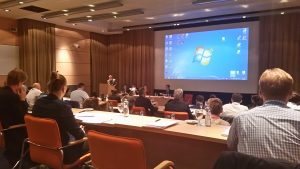RAIN @ The Presidency workshop Enhancing Resilience of Critical Infrastructure
 Brian Caulfield (from TCD) and Zdenek Dvorak (from UNIZA) participated at the Civil Protection workshop held in Bratislava, Slovakia on 13 and 14 July 2016. This workshop was organised in the framework of the Slovak Presidency of the Council of the European Union. The objectives of the workshop were:
Brian Caulfield (from TCD) and Zdenek Dvorak (from UNIZA) participated at the Civil Protection workshop held in Bratislava, Slovakia on 13 and 14 July 2016. This workshop was organised in the framework of the Slovak Presidency of the Council of the European Union. The objectives of the workshop were:
-exploration of the possibility of strengthening resilience of critical infrastructure (next CI) to natural hazards based on the example of case study hazards of flash floods and landslides;
– exploration of potential uses of performance based approach to risk assessment of critical infrastructure;
– strengthening cooperation between civil protection (next CP) and critical infrastructure operators and building trust and preparation of the input for Council conclusions on enhancing resilience of critical infrastructure.
The workshop consisted of a series of two plenary sessions featuring presentations and case studies followed by two hour long group discussions. The first session was started by the evaluation of the findings of the workshop questionnaire, which has been distributed to the Participating States in May 2016. The partners from the Commission and Federal Emergency Management Agency followed by presenting the innovative approach to risk management of critical infrastructure with special focus on performance based risk assessment that is being implemented at the USA. The plenary session continued with presentation of case studies demonstrating the hazards posed by the flash-floods and climate change and presentation on development of innovative tools on assessing the risks to critical infrastructure caused by extreme weather. The second plenary session consisted of the presentation of existing tools that are suited to for the preparedness and response of CI to the risk of flash floods.
The workshop brought together leading stakeholders from governments, public and private enterprises involved protection of CP and CI. Main areas of discussion outputs were in areas of good practices, education, funding, policy making on national and European scale, response and awareness rising.